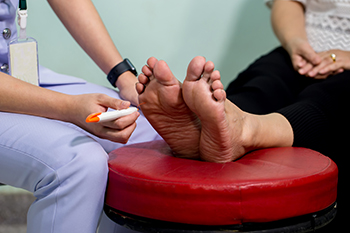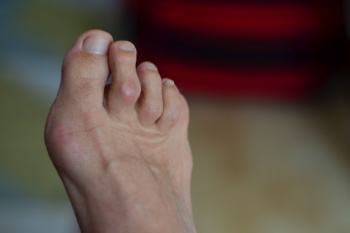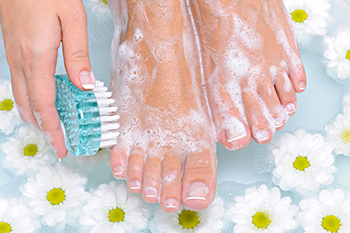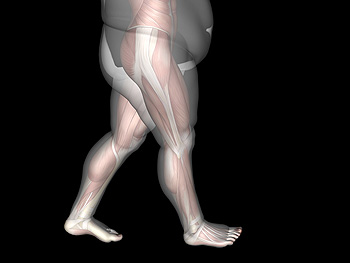Copyright © Michigan Foot and Ankle | Site Map | Nondiscrimination Policy | Design by: Podiatry Content Connection
February 2024
Managing Systemic Diseases of the Feet

Systemic diseases, such as rheumatoid arthritis and diabetes, can seriously affect the feet. Rheumatoid arthritis can cause pain, swelling, and joint damage, while diabetes can lead to nerve damage, poor circulation, and foot ulcers. A podiatrist can help manage these foot issues. These doctors can provide regular check-ups to monitor foot health, offer advice on proper footwear and foot care routines, and treat any foot problems that arise. Podiatrists can also collaborate with other healthcare professionals to create a comprehensive treatment plan tailored to the individual's needs. If you have a systemic disease that affects your feet, it is suggested that you include a podiatrist as one of your regular healthcare providers to help you achieve optimal foot health.
When dealing with systemic disease of the feet, it is extremely important to check the affected areas routinely so that any additional problems are caught quickly. If you have any concerns about your feet and ankles contact one of our podiatrists from Michigan Foot and Ankle. Our doctors will assist you with all of your podiatric needs.
Systemic Diseases of the Feet
Systemic diseases affect the whole body, and symptoms usually are displayed in the feet. This condition can make a patient’s ability to walk unbearable. Systemic diseases include gout, diabetes mellitus, neurological disorders, and arthritis.
Gout – is caused by an excess of uric acid in the body. Common symptoms include pain, inflammation, and redness at the metatarsal/phalangeal joint of the base big toe. Gout can be treated by NSAIDs to relieve pain and inflammation, and other drugs that lower the acid levels in the body.
Diabetes mellitus – is an increase in the level of blood sugar that the body cannot counteract with its own insulin. Failure to produce enough insulin is a factor in Diabetes.
Diabetes of the Feet
Diabetic Neuropathy – may lead to damaged nerves and affect the feet through numbness and loss of sensation.
Peripheral Vascular Disease – can restrict the blood flow to the feet, and often times lead to amputation of the feet.
If you have any questions please feel free to contact one of our offices located in Ferndale, and Milford, MI . We offer the newest diagnostic and treatment technologies for all your foot and ankle needs.
Two Types of Hammertoe and Their Treatments
 Hammertoe is a common deformity in which the second, third, or fourth toe is bent at the middle joint. Hammertoes can either be flexible or rigid. Flexible hammertoe is a milder deformity where the affected toe can still be straightened manually, especially when not bearing weight. This type of hammertoe may cause some discomfort, but tends to be more responsive to conservative treatments, such as wearing roomier footwear or using toe cushions. Rigid hammertoe is a more severe form of the condition. This type of hammertoe is stuck in a bent position and cannot be straightened manually. Rigid hammertoe may result in chronic pain, and corns or calluses may develop due to increased pressure and friction against shoes. Podiatrists may use more aggressive treatments, like splinting or surgical intervention, to align the toe properly and alleviate symptoms of rigid hammertoe. If you have a hammertoe, or you are experiencing pain due to this condition, it is suggested that you schedule an appointment with a podiatrist who can provide you with treatment options that are right for you.
Hammertoe is a common deformity in which the second, third, or fourth toe is bent at the middle joint. Hammertoes can either be flexible or rigid. Flexible hammertoe is a milder deformity where the affected toe can still be straightened manually, especially when not bearing weight. This type of hammertoe may cause some discomfort, but tends to be more responsive to conservative treatments, such as wearing roomier footwear or using toe cushions. Rigid hammertoe is a more severe form of the condition. This type of hammertoe is stuck in a bent position and cannot be straightened manually. Rigid hammertoe may result in chronic pain, and corns or calluses may develop due to increased pressure and friction against shoes. Podiatrists may use more aggressive treatments, like splinting or surgical intervention, to align the toe properly and alleviate symptoms of rigid hammertoe. If you have a hammertoe, or you are experiencing pain due to this condition, it is suggested that you schedule an appointment with a podiatrist who can provide you with treatment options that are right for you.
Hammertoe
Hammertoes can be a painful condition to live with. For more information, contact one of our podiatrists from Michigan Foot and Ankle. Our doctors will answer any of your foot- and ankle-related questions.
Hammertoe is a foot deformity that affects the joints of the second, third, fourth, or fifth toes of your feet. It is a painful foot condition in which these toes curl and arch up, which can often lead to pain when wearing footwear.
Symptoms
- Pain in the affected toes
- Development of corns or calluses due to friction
- Inflammation
- Redness
- Contracture of the toes
Causes
Genetics – People who are genetically predisposed to hammertoe are often more susceptible
Arthritis – Because arthritis affects the joints in your toes, further deformities stemming from arthritis can occur
Trauma – Direct trauma to the toes could potentially lead to hammertoe
Ill-fitting shoes – Undue pressure on the front of the toes from ill-fitting shoes can potentially lead to the development of hammertoe
Treatment
Orthotics – Custom made inserts can be used to help relieve pressure placed on the toes and therefore relieve some of the pain associated with it
Medications – Oral medications such as anti-inflammatories or NSAIDs could be used to treat the pain and inflammation hammertoes causes. Injections of corticosteroids are also sometimes used
Surgery – In more severe cases where the hammertoes have become more rigid, foot surgery is a potential option
If you have any questions please contact one of our offices located in Ferndale, and Milford, MI . We offer the newest diagnostic and treatment technologies for all your foot and ankle needs.
Tips for Happy, Healthy Feet

Your feet carry you through life's journey, so it's essential to give them the care they deserve. From fungal infections to ingrown toenails, foot problems can be painful and inconvenient. However, with proper care and attention, you can keep your feet happy and healthy. Start by maintaining good hygiene, washing your feet twice daily, and drying them thoroughly, especially between the toes to prevent fungal infections like athlete's foot. Keep your skin moisturized, but avoid applying lotion between the toes to prevent fungal growth. Regularly remove hard skin from your heels and use a heel balm containing urea to prevent cracking. Choose breathable, well-fitting shoes made of leather to reduce perspiration and avoid synthetic materials. Trim your toenails straight across to prevent ingrown toenails, and avoid cutting them too short. Maintain clean environments by regularly bleaching your shower area and wearing sandals in public showers. If you experience persistent foot pain or notice any concerning symptoms in the feet, toes, and ankles, it is suggested that you make an appointment with a podiatrist who is medically trained to deal with these problems.
Everyday foot care is very important to prevent infection and other foot ailments. If you need your feet checked, contact one of our podiatrists from Michigan Foot and Ankle. Our doctors can provide the care you need to keep you pain-free and on your feet.
Everyday Foot Care
Often, people take care of their bodies, face and hair more so than they do for their feet. But the feet are a very important aspect of our bodies, and one that we should pay more attention to. Without our feet, we would not be able to perform most daily tasks.
It is best to check your feet regularly to make sure there are no new bruises or cuts that you may not have noticed before. For dry feet, moisturizer can easily be a remedy and can be applied as often as necessary to the affected areas. Wearing shoes that fit well can also help you maintain good foot health, as well as making it easier to walk and do daily activities without the stress or pain of ill-fitting shoes, high heels, or even flip flops. Wearing clean socks with closed shoes is important to ensure that sweat and bacteria do not accumulate within the shoe. Clean socks help to prevent Athlete’s foot, fungi problems, bad odors, and can absorb sweat.
If you have any questions please feel free to contact one of our offices located in Ferndale, and Milford, MI . We offer the newest diagnostic and treatment technologies for all your foot and ankle needs.
It's Time for Beautiful Feet
Weight and Gait

There is a growing concern regarding the prevalence of being overweight or obese among individuals aged 60 and older. Excess weight not only elevates the risk of chronic diseases but also poses a significant threat to physical performance in older adults, potentially leading to dependency. Being overweight or obese in later life is closely linked to adverse outcomes, including a higher risk of falls and an increased likelihood of developing walking limitations compared to those maintaining a normal weight. These challenges are compounded by factors such as low muscle strength, reduced cardiorespiratory capacity, and the elevated energy cost of walking. If you are older and overweight and it is impacting your mobility, it is suggested that you schedule an appointment with a podiatrist to discuss strategies that might help with improved functioning.
The more you weigh, the harder your feet must work to support your body. If you’re an obese individual and are concerned about your feet, contact one of our podiatrists from Michigan Foot and Ankle. Our doctors can provide the care you need to keep you pain-free and on your feet.
Obesity and Your Feet
People who are overweight are putting more pressure on their ankles, knees, and hips as well as their feet. This unfortunately can lead to variety of different issues.
Problems & Complications Stemming from Obesity
- When the body is overweight, it tries to compensate by changing the way that it moves. An obese person may lean forward and put extra weight on the wrong part of the foot. This puts unnecessary stress on the feet.
- Obese people are also more likely to develop type II diabetes which is a condition that causes a lot of foot problems. People with diabetes often don’t feel the cuts and sores that they may have on their feet, which can lead to more complicated and severe issues.
- Plantar fasciitis is another foot condition that can be caused by obesity. Plantar fasciitis is an inflammation of the tissue along the bottom of the foot, which causes pain and stiffness while walking and climbing stairs.
If you have any questions, please feel free to contact one of our offices located in Ferndale, and Milford, MI . We offer the newest diagnostic and treatment technologies for all your foot care needs.







